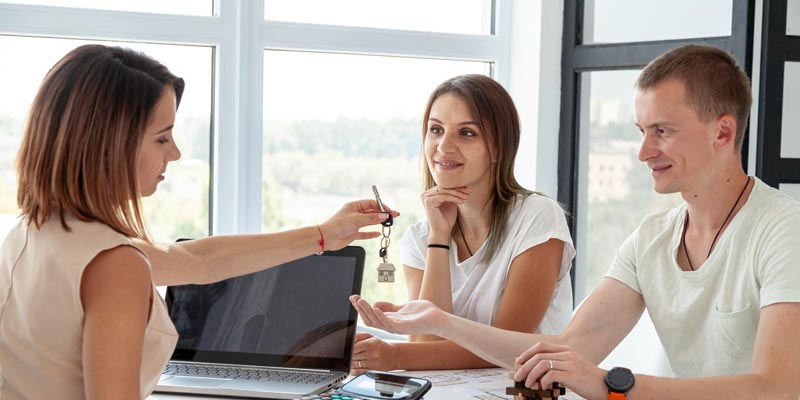Purchasing a home is usually the biggest money move that individuals make during their lifetime. But although spreadsheets, rates of interest, and market fluctuations have their roles to play, the reality is that property choices are not often made through logic. Strong emotions sometimes have a far greater part to play than many would have imagined.
Knowledge of the psychology of home purchasing can empower buyers and real estate professionals alike to make better, more fulfilling choices. Here’s a closer examination of how emotions impact home buying!
First Impressions Are Everything
They tell you you never have a second chance to make a first impression and nowhere is this truer than in real estate and the psychology of buying a house.
When consumers enter a home, their initial reaction usually develops within seconds. As reported in environmental psychology research, individuals make instant judgments about environments based on how they feel. Cleanliness, lighting, smell, and even home temperature can affect those instant emotional reactions.
That is to say that a well-produced home isn’t merely about looks, but it’s about sparking an emotional connection. It’s the distinction between viewing a house and imagining a life within it.

The Power of Visualization
Emotionally motivated shoppers tend to visualize how life will be lived in a potential new home. Can they see themselves enjoying Sunday brunch in that sunny kitchen? Movie nights in that comfy den?
This act of psychological projection is very profound. It’s referred to as affective forecasting, how emotions impact home buying is when an individual attempts to anticipate how future events will make them feel. Properties that enable the easy projection of oneself into the property space, particularly in an optimistic, aspirational manner which are significantly more likely to lead to a sale.
Brokers who get it can spin stories around the property that enable buyers to see themselves living in the home, rather than just viewing the square footage.
Love at First Sight (and the Danger of Emotional Attachment)
It’s wonderful to fall in love with a house, but it can also lead to bad judgment. That’s the psychology of buying a house
When a buyer becomes emotionally invested in a home, they might begin rationalizing imperfections or overreaching their means. This can be particularly risky in hot markets with bidding wars and emotional overbidding, which tend to drive up prices beyond reasonable levels.
It’s usually driven by tiny but potent details: a fireplace that takes them back to their childhood, a yard the same as their grandparents’ house had, or a specific color of paint that speaks to their own sense of style.
Recognizing when love is overtaking logic is essential for making a smart purchase
Fear and Risk Aversion:
Whereas love and enthusiasm motivate some purchasers, others are driven by fear. Fear of paying too much, fear of selecting the incorrect area, or fear of making an ongoing error. That’s how emotions impact home buying
This type of emotional decision-making is based on loss aversion, which is a phenomenon in behavioral economics that states individuals will experience the hurt of loss more than the pleasure of gain. For most buyers, this means hesitation, lengthy decision processes, or even walking away from houses they really like.
Understanding this dynamic helps explain why some deals fall apart at the last minute, not because the home wasn’t right, but because the fear of making a mistake overshadows the excitement.

The Influence of Life Transitions
Major life milestones tend to be the triggers that initiate home buying, marriage, children, a new career, or retirement. Each one of these milestones has a strong underlying emotional pull that drives purchasing decisions, which greatly talks about the psychology of buying a house
For instance, first-time parents would pay special attention to school districts and backyards, whereas retirees would care most about comfort and walkability. These emotional requirements frequently trump conventional investment rationality and govern the entire house hunting process.
Smart sellers and agents know how to stage homes to fit into these emotional landmarks.
Community and Belonging:
For most purchasers, it’s not just about the home, it’s about the community surrounding the home. Is the community inviting? Are the people nice? Can they envision themselves being part of something bigger? This is how emotions impact home buying.
Belonging is an instinctual human need, and people are often motivated to prefer one home over another. Buyers aren’t even aware of how intangible factors such as a friendly passerby or a local coffee shop vibe affect them.
Real estate agents who focus on lifestyle, walkability, and community culture tap into this compelling emotional motivator.
Buyer’s Remorse and the Emotional Aftermath
Even after the delivery of the keys, emotions are still involved and the Psychology of Buying a House.
Some customers go through buyer’s remorse if they felt hurried, went over budget, or disregarded problems.
This post-buying uneasiness is frequently the result of the expectations gap. If the consumer envisioned a perfect picture in a house and then is confronted with surprise repairs or neighborhood sounds, dissatisfaction can rapidly follow.
Agencies which can handle expectations and keep things transparent during the process are able to ease this emotional backlash and encourage long-term client satisfaction.

How Real Estate Agents Can Support Emotionally Driven Buyers
Knowing the psychology of buying a house isn’t only helpful, it’s crucial for real estate agents. Below are a few methods to assist clients better:
- Listen deeply: Frequently, buyers will not openly share their emotional needs. Pay attention to what they dwell on during tours, what they comment on at showings, and what nonverbal signals they give.
- Frame the experience: Engage buyers in a vision of life in a home by spinning a tale, not a recitation of features.
- Balance emotion with facts: Employ fact-based data to back up choices, particularly when feelings are strong.
- Normalize emotions: Inform consumers that it’s okay to feel overwhelmed, excited, or even frightened. Genuine validation of those emotions creates trust and alleviates stress.

Final Thoughts:
At its essence, there are a lot of factors in How emotions impact home buying, purchasing is not merely a transaction. A home buying is an individual experience informed by dreams, fear, hopes, and memories. A home is not merely walls and a roof; it’s a place where life happens.
Knowing the psychology behind home purchase does not equate to eliminating emotion from the process. Rather, it’s about acknowledging its existence, honoring its influence, and overseeing it with compassion. Homebuyers are more likely to find not only a house, but a home, when emotions and reason harmonize.







Add comment